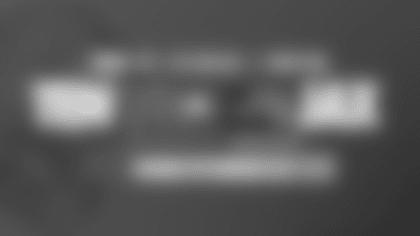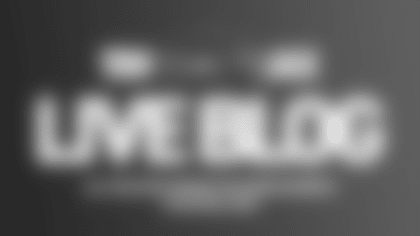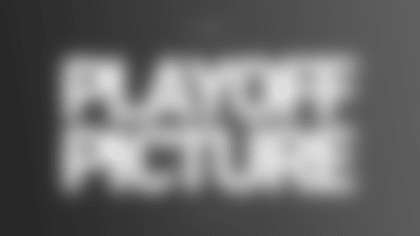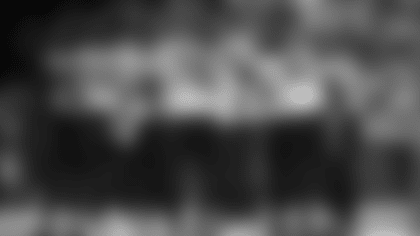INDIANAPOLIS, Ind. – Let's get to it …
Chris from Goodnight, TX:
If the Jaguars are unwilling to pay Allen Robinson $16 million per year, I'm confident a team like the 49ers would. And if he goes to the 49ers, I'm equally confident he will be a perennial Pro Bowler for the next five years. Tag the man.
John: It seems every offseason there is a Jaguars issue that results in an extended and extensive disconnect between the team and fans/observers. A year ago, it was the decision to retain quarterback Blake Bortles as the starter; this year, it's understandably the free-agent dilemma involving wide receiver Allen Robinson. While I understand fans wanting the team to keep Robinson "at any cost," the bigger picture here is NFL decisions don't occur in a vacuum – and that's certainly the case with the decision on whether or not to retain Robinson. While the Jaguars would love to retain him, they apparently are reluctant to do so at a $16 million franchise tag, or something close to that as an annual salary/salary-cap hit. That's because doing so would preclude several other moves around the roster. I point out this as a rather long-winded way of saying this decision is a more complex issue than the team's decision-makers simply gathering in a room and saying, "Tag the man." Are the Jaguars better with Robinson? Certainly. Are they enough better with him to merit losing cornerback Aaron Colvin and making at least one other move in free agency? That's an entirely different question. One thought on your question, though: While he is a good player, if the Jaguars were as confident as you that Robinson – particularly coming off of a torn anterior cruciate ligament – will be a perennial Pro Bowl/elite player, we wouldn't be discussing this. That's because the deal already would have been done.
Chris from Mandarin, FL:
Do you expect a drop-off from the defense next season? That unit's health was uncommonly good. However, all else being equal do you think they can match the level of last season?
John: The health of the Jaguars' defense has become a topic among national observers this offseason. That's understandable because it's difficult to go through a season with the entire defense missing just two starts – as was the case with the Jaguars' defense last season. But while it's very unlikely that the defense will have such good fortune in terms of injuries, improvements in other areas could counteract an injury or two. I expect linebacker Myles Jack to take a big step forward next season, and I think the secondary by virtue of more time together will allow fewer big "breakdown" plays than last season. I also think the offense will improve next season, which could counter any dropoff that occurs defensively.
Jim from Jacksonville:
In retrospect, knowing that at No. 2 the offensive line talent that year was relatively weak, should the Jags have passed on Luke Joeckel in favor of an impact player at another position?
John: Perhaps. But when discussing the 2013 NFL Draft, the question you must ask when it comes to the Jaguars' No. 2 selection is who else you would have wanted in the Top 10 aside from Joeckel? It was generally considered a weak draft at the top whatever the position. There were a few impact players, but getting it right in that draft was a tall order – as evidenced by not just the Jaguars' draft that year, but the drafts of many teams.
Johnson from Jacksonville:
Should the Jaguars draft a running back to replace Chris Ivory or are they fine with the trio they have in Leonard Fournette, T.J. Yeldon and Corey Grant? Grant has tons of speed. So does Yeldon. Maybe get an extra power back to give Fournette some rest.
John: This is a tricky offseason spot for the Jaguars. Adding a running back to the trio of Fournette, Yeldon and Grant will mean carrying four backs plus a fullback (Tommy Bohanon). While the Jaguars kept five backs on the roster this past season, not every team does so. Still, because Grant is a situational back more than an every-down back, there very probably is a need for a fourth back. I would guess the Jaguars carry such a player and I would guess they draft him late or sign him as a collegiate free agent.
Julio from So Cal:
O, you said if no A-Rob, you do not see the Jags targeting a free-agent receiver. Why not sign a guy to a one-year, $10 million deal on a prove-it deal? How about a trade for Austin from the Rams or Dez?
John: Speculating about one-year prove-it deals often is far easier than getting a player to actually agree to such a deal. Remember, too: a one-year, prove-it deal for $10 million takes $10 million in cap space. The Jaguars want to sign cornerback Aaron Colvin and possibly be active in other positions in free agency. That's possible, but you have to be careful where you're spending $10 million chunks.
Travis from High Springs, FL:
I'm as big a Jaguars fan as you will ever see and I used to feel slighted when I felt like the Jags weren't getting the respect that they should on these shows. But listening to these fools the last couple of weeks, I've realized that just because you're an ex-player or ex-executive or ex-whatever you want to be, that doesn't make you an expert on the Jaguars. Any fan who follows the Jags every day, and especially ones who read the O-Zone every day, knows way more about our team than any national analyst. We know free agents we want back, we know execs that got extended, we know this team better than anyone, because it's our team. I'm ready to give up on these "experts" and trust what I hear from T.C, D.C. and D.M.
John: There's nothing inherently wrong with listening to national media discuss the Jaguars so long as you remember that on most fronts the people who follow the team every day are going to have a better feel for what's going on with the team than national analysts. This is not because national analysts are unintelligent or lazy; rather, it's because national analysts have 32 teams on which to focus and therefore are going to miss on a lot of details of particular teams that local media understand. One exception to this rule often is "breaking" news such as player contracts and free agency. Breaking news on this front often will come from national media with strong ties to agents because agents are often going to inform national reporters before teams share such news with local reporters. This is because the team typically wants to ensure news is official – i.e., signatures on "dotted lines" and transactions filed with the league office – before releasing it. That's not ideal for fans who crave immediate news from local outlets, but it's just the way it is in our 24-7 news cycle.
Ray from Monroe, CT:
Colin Cowher said Bortles is the fourth-best quarterback in the AFC South? He actually said Marcus Mariota carried the Titans' offense … must have missed that when he threw more interceptions than touchdowns. Do you agree and think Bortles is the fourth-best quarterback in the AFC South?
John: The health of Andrew Luck (Colts) and DeShaun Watson (Texans) makes this a tricky question, but if you assume those players will return to their pre-injury form then they perhaps are the two best quarterbacks in the South. I have a tough time putting Mariota ahead of Bortles based on the results of last season.
Joe from Fleming Island:
John, in regard to free-agent players … we have a general manager, an executive vice president for football operations and an executive to assist in managing the draft. So when it comes to issues such as paying to sign a free agent (for example, Allen Robinson) while also understanding you have three or four young Pro Bowl-level players who will need to get paid in the next year or two. Who decides what can and cannot be done this year?
John: The information typically is gathered as a group with a consensus reached, but final decisions are made by Jaguars Executive Vice President of Football Operations Tom Coughlin.
Joel from Boston, MA:
Big John: Particularly around this time, there is talk about how different the offensive approaches are between the college and pro game and how linemen, receivers and specifically quarterbacks need to make significant adjustments. It got me wondering, to what extent do these differences affect defensive players in their transition to the pro game? Is it mainly about just adjusting to the differences in speed/size or has the change in offensive play calling made it more difficult for defensive players to make the transition?
John: Defense typically is an easier transition because it's more read, react and attack. That's not to say it's an easy transition in any respect because the speed of the game is so much greater, but the schemes don't change nearly as much as defensive schemes.
Phillip from St. Augustine, FL:
John, are you mad, bad and dangerous to know?
John: Yes.
Jaguars News | Jacksonville Jaguars - jaguars.com
Mar 03, 2018 at 12:14 AM
This article has been reproduced in a new format and may be missing content or contain faulty links. Please use the Contact Us link in our site footer to report an issue.













